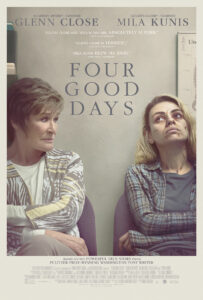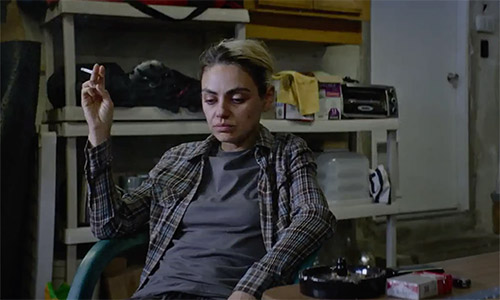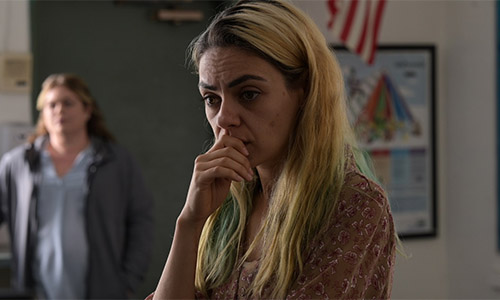 I sure did want to like Four Good Days, Rodrigo Garcia’s (Albert Nobbs, Passengers) Heroin-recovery-centered drama co-starring (Mila Kunis – Black Swan, The Book of Eli), and Glenn Close (Dangerous Liaisons, Fatal Attraction). It had everything I wanted in my heaving-hitting addiction dramas. It had a strung-out lead in 31-year-old Molly (Kunis) and that one person that, hopefully, all people have who will do anything to save this person they so dearly love. In this case, it is Molly’s mother, Deb (Close). The elements were in place for this to be a movie that knocked it out of the park. However, it was so severely flawed that it sometimes inadvertently detracted from the story it was trying to tell. As much as I struggled with its flimsy screenplay, its miscasting of Deb with Close, and its peculiar ending, it stuck with me so much that I wanted to go home immediately after watching it to review it. There is zero percent chance that Four Good Days ends in my 2020 Top Ten Movies of the Year list, but I fully imagine that I will remember every little bit about this movie at the end of the year as I do today (May 6th), and not for the wrong reasons.
I sure did want to like Four Good Days, Rodrigo Garcia’s (Albert Nobbs, Passengers) Heroin-recovery-centered drama co-starring (Mila Kunis – Black Swan, The Book of Eli), and Glenn Close (Dangerous Liaisons, Fatal Attraction). It had everything I wanted in my heaving-hitting addiction dramas. It had a strung-out lead in 31-year-old Molly (Kunis) and that one person that, hopefully, all people have who will do anything to save this person they so dearly love. In this case, it is Molly’s mother, Deb (Close). The elements were in place for this to be a movie that knocked it out of the park. However, it was so severely flawed that it sometimes inadvertently detracted from the story it was trying to tell. As much as I struggled with its flimsy screenplay, its miscasting of Deb with Close, and its peculiar ending, it stuck with me so much that I wanted to go home immediately after watching it to review it. There is zero percent chance that Four Good Days ends in my 2020 Top Ten Movies of the Year list, but I fully imagine that I will remember every little bit about this movie at the end of the year as I do today (May 6th), and not for the wrong reasons.
In the film’s first scene, heroin-addicted Molly shows up at the front door of the home her mother shares with Molly’s stepfather, Chris (Stephen Root – Bombshell, Get Out). She is rain-thin and pale, trembling uncontrollably and stumbling (or almost stuttering) through her words as she tries to speak. It took only two minutes for me to think that Kunis could not perform Molly’s role. It felt like she was overacting from the very get-go, too, perhaps getting the audience as far from thinking of her as Jackie from That ’70s Show. While it has been 15 years since that show ended, Kunis and Ashton Kutcher have worked extremely hard to shed the memorable characters they each created from that television show. However, it took only ten minutes from my initial perception to be convinced that my first impression was completely wrong.
Kunis crushed this role. As frustrating as this movie was at times, it was held together almost exclusively through her performance. Close’s portrayal of Deb could have been better. Her character was believable, but she struggled opposite Kunis. Who would have thought Jackie would have outshined an eight-time Oscar winner like Close from That ’70s Show? But that was precisely what happened here. I wondered why the dynamic didn’t click with me, even though I liked each character. Unfortunately, what I kept coming back to was that Close felt too old for me in this role. And I hate having to say something like that, but it’s true in this case.
I compare this movie to the Julia Roberts/Lucas Hedges 2018 incredible Ben is Back. Like Four Good Days, the film centers around a drug-addicted young adult whose mother will go through hell and back to help her child break free from the grip of addiction. Also similar was how their heroin addiction started, resulting from a physical injury as a teenager in which each was over-prescribed opiates that then led to future drugs, such as crack, Adderall, heroin, and Methadone. Both mothers in each movie already have a justifiable vendetta against doctors in general, blaming the profession for their child’s addiction. But Julia Roberts is 53 while Close is 74. Watching Roberts snake through a dirt room felt far more believable than watching Close do the same thing. And while Kunis’ Molly was 31 while Hedges’ Ben was about 20, the dynamic between Kunis and Close was still off.

Our story revolves around Molly going to detox for the 15th time in 10 years. Fifteen detoxes mean 15 relapses. That’s where the bottom line of Deb changing the house locks and keeping Molly away until she came back 100% clean came into play. She can convince her mom to drive her to detox because this was the time she was serious about getting clean. After her three days in detox, the pair meet with a doctor who describes a new FDA-approved drug therapy called Naltrexone, which blocks the effects of opiates and, thus, the high that feeds the addiction by the patient receiving one shot a month. The problem is that to start receiving the shot, the patient needs to be completely free of all drugs they’ve been abusing for seven days. She has three complete from detox. However, The next four will seem like an eternity to Molly and Deb.
Watching Kunis transverse the landscape during this four-day period is, quite honestly, breathtaking. She showcased a range as a leading actress I didn’t think she had. She was excellent in a supporting role in Black Swan, but as a lead, she not only surprised but impressed. I can’t go so far as to say that this is award-worthy, but that is primarily because of the script. Too often, we were dropped into scenes that just weren’t believable. We had scenes only to have scenes that overtly told us what we already knew on our own…that Molly’s addiction affected not just her life but everyone around her. There didn’t need to be a conversation between Deb and Molly when Molly was shivering so severely in bed that she thought she would die because Molly once stole and sold Deb’s engagement and wedding rings. We know that addicts lie, cheat, and steal and lack the ability to think about anything other than getting their next fix.
While I understand that this is based loosely on a true story, I’m not sure Molly’s children needed to be in the movie. I understand it gives her a different depth, but it was counterproductive. Garcia wanted to show that not even her kids could keep her from breaking free from her addiction. That was enough without the kids. The kids just being in a single scene was odd, as was the whole dynamic with their dad. Was Sean (Joshua Leonard) her husband or ex-husband? Why was their relationship so cordial after ten years of her battling addiction and being so far removed from the picture? He had a girlfriend that the children brought up. I don’t know what the point of this conversation was. Likewise, asking her to get painkillers for her back needs to be an onscreen conversation. The repeated conversations between Deb and Chris about Molly’s impact on Deb’s health weren’t needed. We were keenly aware. Deb’s four-minute visit to Molly’s father’s home was inserted only to show further that she was willing to fight for their daughter when he was only reconnecting with Molly once she was clean again. We continually got dumped into the middle of conversations that made no sense other than to explain things that we didn’t need explaining.

There was a similar situation between Deb and her elder daughter Carla, a woman thriving in her career but with her share of lesser struggles that Deb wanted to make space for but could not. The conversations were so out of place in terms of the characters even having them at this point into Molly’s addiction that it was eye-rolling at times. Likewise was, Molly’s “don’t do drugs” speech to a class of high school students on day three of her four days at home. Molly and Deb ran into a former teacher of Molly’s who invited her to speak to her class. There were so many problems with this premise, the first being that a junkie just four days out of detox wouldn’t have flown in any school system I know. Nor would the turnaround time of being at the school the next day to talk to a class of about 12 kids, whereas a class like that would have had closer to 35. But I get it. The speech itself was what we, as the movie audience, needed to hear Molly give a group of people that we hadn’t heard before.
Close gave a solid performance as a frantic mother struggling to stay true to her bottom line. Her constant worry over Molly’s well-being, whether her daughter is home or not, weighs heavy. Her stress is a storyline in itself. At what point do you have to concentrate on your own health more than you do your drug-addicted child? What an impossible question to have to be tasked with. As this movie entered its third fact, a point that I’ve thought about frequently over the last decade or so came to the forefront. And that is, at the end of the day, the only people who genuinely care for you unconditionally are your mother and father. At her most desperate, Molly had her mother. Yes, her mother was suspicious of everything related to her daughter, so much so that it was all she could concentrate on. It was a secondary storyline that played out reasonably well. But, again, there was intended to be a closeness that I was supposed to feel between Deb and Molly that just felt a little too disjointed, which I attribute most to Deb’s age. That’s not to say an older parent won’t do anything for their child because we know they would. I wouldn’t say that it was more grandmother-granddaughter, but, at the same time, that didn’t feel entirely out of the realm at times. The relationship was undoubtedly mother and daughter in conversation and tone. But it didn’t appear that way visually, at least for me.
The last 15-20 minutes of the film was odd. There was a reveal that I won’t give away. And then there was a ploy between mother and daughter, which made a ton of sense. The ability to pull it off was far too simple, and was it worth the risk? Again, I get it from the perspectives of both Deb and Molly, but it was not rational thinking. And what they tried to get away with, I don’t think, could have possibly happened. So, again, I get it, but the only sequence of events seemed abnormal. And the conclusion that we may have been hoping for wasn’t there, but could it have ever been? Either you make it through your life and die clean, or you make it through your life and die addicted. Addiction is a lifelong disease that can’t be wrapped in a movie, tied with a bow and ribbon. I felt we knew pretty early that this movie would end with some ambiguity. I didn’t think it would end quite the way it did. But it also was an easy way out and made sense.
Her work in Four Good Days will land Kunis some upcoming opportunities. As a drug-addicted junkie, I haven’t seen many better performances in recent memory. Not only did she look the part physically, but she also played the part. As fragmented as some scenes were, the film was well-paced due to its incredibly forced dialogue. Molly’s anger, fear, self-hatred, and shame were fully displayed. She hid nothing and constantly reinforced her feelings about how her addiction completely destroyed her life. It resonated strongly with me how she would wake up every single day for years with the intention of making it through an entire day without doing drugs, only to be in contact with her dealer within the hour to secure those same drugs. Her only goal was to get high because it gave her the feeling of life and numbness that she wasn’t able to experience when she wasn’t high, and she had time to reflect on what a disappointment her entire life had been. We rooted for Molly hard. This alone brought much effectiveness to the whole film. I mean, we rooted for her. Each challenge she faced seemed highly realistic. My biggest beef with her needing to stay clean for four days to get the shot was that she was still allowed to be in an environment with triggers and opportunities for escape. While not wealthy, Deb and Chris would have had enough cash to hire some help, rent out a suite in a nice hotel, and keep her mind occupied until she could return to the doctor’s office on the fourth day to receive her shot.
Kunis has a new fan in me. The movie as a whole is flawed, but it will stick with you. Kunis’s performance will be what you remember the most. If you’re like me, you’ll keep an eye on her upcoming projects. She was phenomenal.
Plot 9/10
Character Development 8.5/10
Character Chemistry 7.5/10
Acting 9.5/10
Screenplay 7/10
Directing 7/10
Cinematography 9/10
Sound 7/10
Hook and Reel 9/10
Universal Relevance 10/10
83.5%
Movies You Might Like If You Liked This Movie
-
- Ben Is Back
- Beautiful Boy
- Requiem for a Dream
- Rush
- Trainspotting